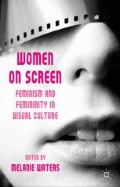Abstract
The character of Sydney Bristow in Alias (Warner Brothers, 2001–06) offers a compelling representation of the female spy that both reflects and illuminates contemporary debates about the role of women in the professions.1 The cinematic production values of this spectacular series, together with its complex narrative arcs and stellar guest list, epitomize what has come to be known as American quality television.2 As with earlier quality television series centred on female protagonists — such as Ally McBeal (Fox, 1997–2002) and Buffy the Vampire Slayer (Warner Brothers/UPN, 1997–2003) — Alias focuses on the uneasy relationship between women’s professional ambitions and personal responsibilities. Like these earlier shows, Alias explores the profound inextricability of the professional and the familial/romantic, positioning the workplace as a space in which and through which the personal is worked upon. Exploring the ways in which emotional labour is tethered to professional employment, quality series such as Alias function — at one level — as etiquette guides for the (post)modern urban woman. In this respect, Alias does invite consideration alongside HBO’s Sex and the City (1998–2004), in which the drama is based around the sexual practices and quandaries of four women with apparently limitless time and funds. Certainly, Carrie Bradshaw and friends have hours to spend planning, engaging in, and discussing their emotional and sexual lives.
Access this chapter
Tax calculation will be finalised at checkout
Purchases are for personal use only
Preview
Unable to display preview. Download preview PDF.
Works cited
Abbott, S., and Brown, S. (eds.) Investigating Alias: Secrets and Spies. London: I B Tauris, 2007.
Alias. Warner Bros, 2001–2006. 1.10. “Spirit”. Dir. Jack Bender. December 16, 2001.
Alias. Warner Bros, 2001–2006. 3.11. “Full Disclosure”. Dir. Lawrence Trilling. January 11, 2004.
Alias. Warner Bros, 2001–2006. 5.12. “There’s Only One Sydney Bristow”. Dir. Robert M. Williams Jr. April 26, 2006.
Angelini, S. “Endoscopic Spies: Mapping the Internal Landscape of Alias”. Investigating Alias: Secrets and Spies. Ed. S. Abbott, and S. Brown. London: I B Tauris, 2007. 27–39.
Barnes, E. “The New Hero: Women, Humanism and Violence in Alias and Buffy the Vampire Slayer”. Investigating Alias: Secrets and Spies. Ed. S. Abbott, and S. Brown. London: I B Tauris, 2007. 57–72.
Douglas, S. J. Where the Girls Are: Growing Up Female With the Mass Media. London: Penguin, 1994.
Finding, D., and A. MacLachlan. “Aliases, Alienation and Agency: The Physical Integrity of Sydney Bristow”. Investigating Alias: Secrets and Spies. Ed. S. Abbott, and S. Brown. London: I B Tauris, 2007. 73–86.
Fiske, J. Television Culture. London: Routledge, 1987.
Gamble, S., ed. The Routledge Companion to Feminism and Postfeminism. London: Routledge, 2001.
Irigaray, L. “When the Goods Get Together”. New French Feminisms: An Anthology. Ed. E. Marks, and I. de Courtivron. Hemel Hempstead: Harvester, 1981. 99–110.
—. Je, Tu, Nous: Toward a Culture of Difference. London: Routledge, 1993.
—. “Women on the Market”. Literary Theory: An Anthology. 2nd edn. Ed. J. Rivkin, and M. Ryan. Oxford: WileyBlackwell, 2004. 799–811.
Jancovich, M., and J. Lyons, eds. Quality Popular Television. London: BFI, 2003.
Jones, A. “‘She Was Bad News’: Male Paranoia and the Contemporary New Woman”. Camera Obscura 25–26 (January–May 1991): 297–320.
Ledger, S. The New Woman: Fiction and Feminism at the Fin de Siècle. Manchester: Manchester University Press, 1997.
McRobbie, A. The Aftermath of Feminism: Gender, Culture and Social Change. London: Sage, 2009.
Modleski, T. Loving With A Vengeance: Mass-Produced Fantasies for Women. London: Methuen, 1984.
Mulvey, L. Visual and Other Pleasures. London and Basingstoke: Macmillan, 1989.
Nye, J. L. “Why Sydney Has No Social Life”. Alias Assumed: Sex, Lies and SD-6. Ed. K. Weisman with G. Yeffeth. Dallas: Benbella Books, 2005. 89–100.
Perrons, D. “The New Economy and the Work-Life Balance: Conceptual Explorations and a Case Study of New Media”. Gender, Work and Organization 10.1 (January 2003): 65–93.
Radner, H. Shopping Around: Feminine Culture and the Pursuit of Pleasure. London: Routledge. 1995.
—. “New Hollywood’s New Women: Murder in Mind — Sarah and Margie”. Contemporary Hollywood Cinema. Ed. S. Neale, and M. Smith. London: Routledge, 1998. 247–61.
Ruditis, P. Alias: Authorized Personnel Only. New York: Simon and Schuster, 2005.
Stanworth, C. “Women and Work in the Information Age”. Gender, Work and Organization 7.1 (January 2000): 20–32.
Takacs, S. “Speculations on a New Economy: La Femme Nikita, The Series”. Cultural Critique 61 (Fall 2005): 148–85.
Tasker, Y. Working Girls: Gender and Sexuality in Popular Cinema. London: Routledge, 1998.
White, R. Violent Femmes: Women as Spies in Popular Culture. London: Routledge, 2007.
Wright, L. A. “Only Ourselves to Blame”. Alias Assumed: Sex, Lies and SD-6. Ed. K. Weisman with G. Yeffeth. Dallas, Texas: Benbella Books, 2005. 199–212.
Editor information
Editors and Affiliations
Copyright information
© 2011 Rosie White
About this chapter
Cite this chapter
White, R. (2011). Alias: Quality Television and the New Woman Professional. In: Waters, M. (eds) Women on Screen. Palgrave Macmillan, London. https://doi.org/10.1057/9780230301979_4
Download citation
DOI: https://doi.org/10.1057/9780230301979_4
Publisher Name: Palgrave Macmillan, London
Print ISBN: 978-1-349-31098-2
Online ISBN: 978-0-230-30197-9
eBook Packages: Palgrave Media & Culture CollectionLiterature, Cultural and Media Studies (R0)

